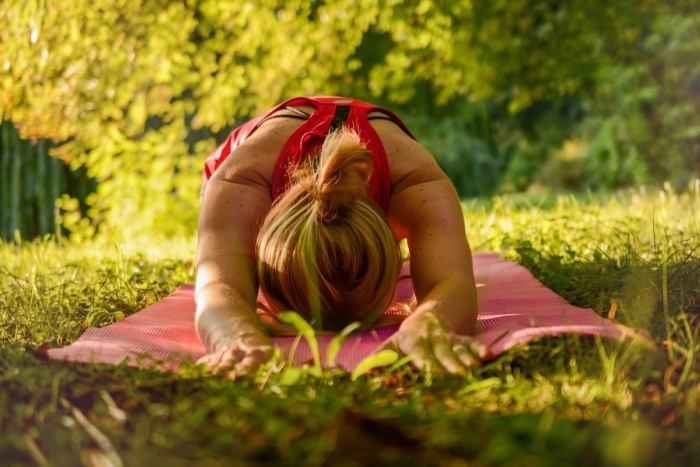I believe that it does! Yoga has been such a transformative practice for me. I started taking yoga in college, over 40 years ago. I was a dancer and performer in high school and there was no dance program at the school I attended in Vermont, but there was a yoga class. I remember trying to find that feeling of ease/bliss that was supposed to happen in savasana (the corpse pose at the end of a yoga class) and one day, I finally did. I became a believer then and still believe that yoga makes you feel good –better able to manage life, and therefore, nicer.
This was especially clear to me as I practiced regularly and diligently in the 90’s – a tumultuous time when my marriage was faltering, my children were getting older, and I was entering midlife. Yoga was my sanctuary. A place where I could put aside my worries and concerns, my anger and frustration and be with myself in practice. It truly helped me feel better.
I knew yoga had benefits that went beyond the physical, I was a nicer person after yoga, feeling calmer and more able to handle my chaotic life. This was my inspiration to become a yoga therapist, holistic nurse and mindfulness teacher. The practices that helped me find my pathway to healing could help others and I wanted to share what I had experienced in my own life.
Fast forward to today. Now there is a research study conducted by a major university that investigated the benefits of yoga and how it affects relationships. Two things are amazing about this: one is that the research was approved and funded, and that the evidence of yoga benefits beyond the physical (there is a lot of evidence of using yoga for back pain, etc.) are defined and supported through this study.
You see, the traditional biomedical world would most likely look at yoga as a physical modality that had physical benefits for muscular-skeletal issues. That would be why your doctor – who cannot fix your back pain but can give you a muscle relaxer to alleviate it – might suggest yoga as a way to help you. But this study looked at the benefits from a psycho- emotional perspective and was able to quantify what happens to improve your mood.
Published in the Journal of Holistic Nursing, a peer reviewed medical journal, the researchers surveyed over 1,000 yoga practitioners from all over the country and asked them about their practice and how it benefited them. The three most prevalent themes in the responses were:
1). Yoga leads to personal transformation.
2). Yoga increases social interaction.
3). Yoga provides coping mechanisms to weather relationship difficulties and losses.
4). Yoga leads to spiritual transcendence and connection.
This article is even more amazing as it supports the findings as evident through a reference to the ancient text of Patanjali, The Yoga Sutras. This text is the foundation of yogic philosophy and dedicates more of its content to the potential benefits for relief of human suffering and overcoming life obstacles by steadying the mind and studying our own inner experience through meditation.
As the world and our lives today brings us chaos and unrest, the community of yoga students that arrive every week to join in community, to steady their minds and see through the veil of uncertainty, leaning into hope and faith to embrace their own inner resources for healing, the research only confirms what they have come to know.
I bow in gratitude to the ancients and the modern day researchers who help expand the positive energy of this powerful practice that makes all of us nicer!
“I Am a Nice Person When I Do Yoga!!!” A Qualitative Analysis of How Yoga Affects Relationships. by Alyson Ross, PhD, RN; Erika Friedmann, PhD; Laurie Williams, MA; and Sue Thomas, PhD, RN, FAAN. Journal of Holistic Nursing. 10.1177/0898010113508466

